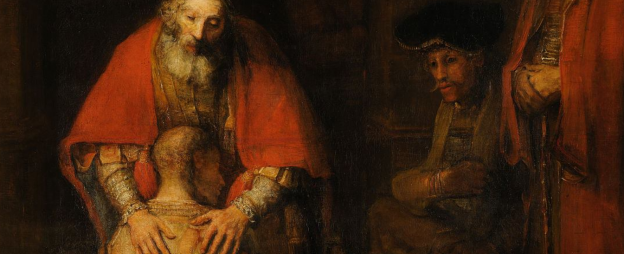Summary
There are few things worse in life than suffering the anger and condemnation of others, especially when it is justified. And one of the sweet joys in life is the relief and reconciliation we feel when we receive forgiveness. This is even more so in our relationship with God.
Psalm 32 speaks of the free and rich grace of God to forgive us of our sin. The psalm speaks of the blessing of forgiveness with a personal testimony. It then encourages God’s people to seek God’s forgiveness and follow his teaching, rejoicing in their forgiveness.
Our passage explained
v1-2
Speaking with the voice of wisdom, David opens his psalm speaking of the blessing of forgiveness. Using three different words (in Hebrew) to describe sin, David proclaims “Blessed is the one whose transgression is forgiven, whose sin is covered … against whom the Lord counts no iniquity” (vv.1-2).
Forgiveness is receivable for rebelling against God, for “missing the mark” by generally offending God, and for distorting or twisting God’s ways. Forgiveness is then described as a taking away, a covering, or not counting against us. Sin is removed, and in the forgiven ones “spirit there is no deceit” (v.2; that is, no presence of sin).
v3-7
David uses a personal testimony to establish the blessing of forgiveness. At some point he “kept silent” in confessing his sin to God, and as a result felt the burden of God’s anger physically as “my bones wasted away through my groaning all day long” (v.3). The physical effects from his spiritual condition were caused by God’s hand upon him, sapping his strength like the hot sun (v.4).
God’s discipline drove David to confess his sins, not trying to cover them up himself (v.5). He then experienced God’s free grace as God “forgave the iniquity of my sin” (v.5).
David’s experience of the blessing of forgiveness compels him to encourage all God’s people to seek God’s forgiveness too. He encourages “everyone who is godly”, that is God’s people, to “offer prayer to [God] at a time when you may be found” (v.6). Those who reach out to God in faith will be protected (v.7), even when “the rush of great waters” (v.6) look like overcoming him.
v8-11
David’s encouragement is supported by God’s own words in verses eight and nine. God states he will “instruct you and teach you in the way you should go” and “counsel you with my eye upon you” (v.8). God encourages his people to accept his teaching and guidance.
The acceptance God seeks is a willingness to follow, not stubborn and reluctant following. We should not be like a horse or a mule which must be reluctantly guided by a bridle or bit in the mouth (v.9). Instead we should joyfully seek to follow God’s ways.
If we joyfully seek God’s ways and seek his forgiveness, joy and assurance are the reward. The wicked who do not see forgiveness from God will endure many sorrows, in this life or the next. But God’s covenant love “surrounds the one who trusts in the LORD” (v.10).
Therefore, David encourages God’s people to “be glad in the LORD, and rejoice, O righteous, and shout for joy, all you upright in heart!” (v.11). Gladness, rejoicing, and joy belong to those who rest in God’s free grace.
Our passage applied
The Apostle Paul refers to this psalm in Romans 4, when he discusses how salvation is an act of God’s free gift of grace, and not works. This psalm reminds us that our justification, that which declares us right with God, is received by grace alone through faith alone, not because of our works.
Just as it was for Abraham and the Patriarchs (see Hebrews 11) and for David, so too it is the case for us. We cannot justify ourselves by our works, we are forgiven by an act of God’s grace.
What a blessing to be forgiven! This psalm reminds us that, in the Apostle John’s words, “if we confess our sins, he is faithful and just to forgive us our sins and to cleanse us from all unrighteousness” (1 John 1:9). God does not require deeds but instead freely forgives the iniquity of our sin.
In this psalm is a great encouragement to us to seek forgiveness from God. We cannot hide our sins from God, nor should we. Instead, like David, we should seek God’s forgiveness and offer prayer to him when he may be found. Like the weeping woman who knew God’s forgiveness granted to her through Jesus and loved Jesus accordingly (Luke 7:36-50), we too can experience great joy and rejoicing in God’s free grace given through Jesus.
Our joy and love in the blessing of forgiveness then motivates our response which is loving service and obedience to God. Not because we feel compelled like a horse with a bridle, but out of devotion and love for what we have received.
As we walk in God’s ways, experiencing God’s free grace, we can be glad, rejoice, and shout for joy. The blessing of forgiveness.
Resources
Questions? Please contact us. Inspired? Come and worship with us on Sundays.

